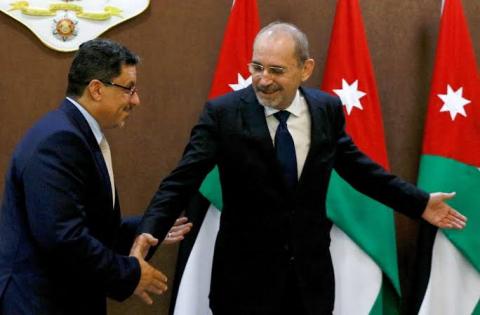Missile attacks fuel support for reversing U.S. stance and placing Yemen rebels back on terrorist blacklist


Expanded missile attacks by Yemen’s Houthi rebels have fueled support among some U.S. and Middle Eastern officials for placing them back on a U.S. terrorist blacklist, a year after the Biden administration ended that designation on humanitarian grounds.
The possible naming of the Iranian-backed rebels as a proscribed “foreign terrorist” organization, which would criminalize dealings with the group, is being raised following attacks on Yemen’s Gulf neighbors, including on a base housing U.S. troops in the United Arab Emirates.
But such a step, if approved, would constitute a highly unusual reversal of an earlier decision to end a Trump-era terrorist designation that Biden administration officials said would worsen already-dire conditions for Yemeni civilians. Humanitarian groups are warning that a renewed designation could have the same punishing effect as it would hamper getting aid into the country.
Peter Salisbury, a senior analyst for Yemen at the International Crisis Group, said there was no evidence that the designation would impact the ability of the Houthis, who have been locked in a war with a Saudi-led coalition since 2015 and now control much of Yemen, to conduct the drone and missile attacks that have made them a regional threat.
“We’ve fallen back into the problem that, in absence of good options, they’ve started looking at bad options, largely to be seen as looking tough to their regional allies and some political constituencies in Washington,” he said.
Last month, President Biden said his administration was considering adding the Houthis back to the State Department’s registry of “foreign terrorist organizations” or FTOs. Inclusion on the list makes those dealing with them vulnerable to potential prosecution for “material support” to terrorism, unless they fall under government exemptions.
The remark was an acknowledgment of the administration’s evolving approach to Yemen’s long conflict, which has killed tens of thousands of civilians and thrust many more into hunger and disease. Just weeks after taking office, the Biden administration announced it would remove the rebels from the terrorist list, reversing a decision made in the waning hours of the Trump administration as part of an effort to pressure groups affiliated with Iran.
Announcing the move, Secretary of State Antony Blinken said that lifting the designation would “ensure that relevant U.S. policies do not impede assistance to those already suffering what has been called the world’s worst humanitarian crisis.”
Since then, however, the administration’s efforts to broker a peaceful resolution to Yemen’s civil conflict have made little progress. The Houthis have continued to launch regular missile and drone strikes on Saudi Arabia and, in recent weeks, expanded their attacks on the United Arab Emirates, which is part of the anti-Houthi military coalition.
In one recent incident, three people were killed in a suspected drone attack on the Abu Dhabi airport and an industrial area. In another, missile fire forced U.S. personnel at the al-Dhafra air base to take cover and employ Patriot air defenses.
Since those attacks, officials have held discussions about using a renewed designation as one option to counter the rebel threat, according to individuals familiar with the discussions who spoke on the condition of anonymity to discuss internal deliberations. While officials at the State Department and the Agency for International Development have overwhelmingly opposed such a move, senior officials at the National Security Council have supported it, the individuals said.
Other potential steps include naming individual Houthi officials as “specially designated global terrorists,” imposing sanctions on them, the individuals said.
The White House and State Department declined to comment on the discussions.
The Saudi, Emirati and Israeli governments are among those that have been advocating for the re-designation, working with lobbying and communications firms in an attempt to rally support on Capitol Hill and in the Biden administration, according to congressional aides and diplomatic personnel.
The Emirati government has circulated a “white paper” that compiles statements from lawmakers and outside experts condemning Houthi violence and argues a designation can occur without compounding humanitarian problems.
“Together, we must be clear-eyed about the threat the Houthis pose,” the UAE embassy said in a statement. “If you talk like a terrorist, act like a terrorist and kill like a terrorist, then you are a terrorist.”
Humanitarian groups are warning against a renewed designation, pointing to the effect of the Trump administration’s short-lived designation as proof it will punish ordinary Yemenis, despite exemptions that would likely be granted by the Treasury Department for aid work.

Yemeni officials on Monday condemned arrests and prosecutions by the Iran-backed Houthi militia directed against media, journalists and celebrities…

Yemen's warring parties are gearing up for new waves of conflict in 2023 amid a lack of decisive steps towards sustainable peace, adding to the suf…

The UAE will help to recruit doctors and deliver crucial supplies for hospitals in Yemen under a major healthcare drive. The Khalifa bin…